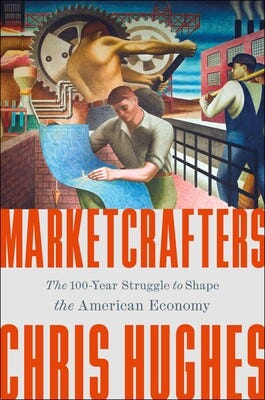Globalization's next competition: guardrails on or off?
A transformative global era both beckons and tempts
You know my larger argument: The world is presently enduring a collision of great inevitabilities surrounding climate change, demographic transitions, the emergence of a global middle class, the ideological fight over who rules it (Left, Right, or the Middle itself), the Military Singularly unfolding in Ukraine, etc. This Zone of Turbulence presents the US with many challenges in terms of leading, following, or just plain getting out of the way. There are profound choices to be made in every realm, a key one being in cyber (AI, 5G, IoT, AIoT) amidst globalization’s ongoing digitalization.
So …
Interesting NYT op-ed about why Silicon Valley types are coming out for Trump in such numbers, the supposed mystery being why such techno optimists would support someone whose economic thinking is so hopelessly backward (e.g., tariffs as THE answer to every problem we think we have with the global economy!).
The title argues that it’s “not just about money” but really more about a regulatory mindset.
The author is Chris Hughes, a co-founder of Facebook who’s got a book coming out with the intriguing title Marketcrafters: The 100-Year Struggle to Shape the American Economy.
Remembering my admonition about America needing to find some new sense of balance between its historic market-making role (1945-2008) and its recent lapse into turbo-charged market-playing (necessary, I argue, but overboard — particularly in the form of Trump). So, yeah, Hughes’ credentials and ambition here seem spot on for the subject.
Hughes states the obvious attraction: Trump is supremely malleable (the last-person-to-whisper-in-his-ear dynamic) and a lot of these guys want unbridled development of AI and crypto-currencies. He counters that libertine environment by noting the Progressive Era vibes given off by the Biden-Harris admin:
More than any other administration in the internet era, President Biden and Ms. Harris have pushed tech companies toward serving the public interest. Key to their approach is the support of start-ups to counterbalance the dominance of tech giants, whose combined market value eclipses the G.D.P. of many countries.
Of course, these are natural tensions amidst a transformative economic and political era such as most of the world now endures: government wants a say and major players (the “trusts” of our age) want as little of that as possible.
Here I spot genuine tension between what America needs domestically and what it needs internationally.
Domestically, I would side with the Dems: temper the power and reach of these tech behemoths, regrade an economic landscape that’s grown far too unequal and thus impinges on our political system in the form of billionaires trying to buy elections, and do whatever it takes to keep our national ethos middle-class-centric. On the face of it, I am far more worried about these tech giants ruining democracy than I am about our economy not reaping — fast enough — the benefits of these technological advances.
“Fast enough” is the key bit here, because therein we find the opposite tensions in the international realm, where a US go-slow approach would seem to leave far too much of the world — and particularly the rising Global South — for China to capture through its combination package of the Belt and Road Initiative (hard infrastructure) and its mass surveillance technology offerings (“Safe Cities” via 5G, IoT, AIoT).
In effect, then, I want to have my cake and eat it too — always a contradictory ambition. I don’t want Big Tech to go too fast here at home for fear of what it might cost in personal liberty (Big Tech’s Big Brother instincts are profound, despite all its talk of “freedom”) and yet I want to almost weaponize it against China’s creeping integration of the rest of the world (which I view as THE competition with China this century — not the sideshow Taiwan that we obsess over or that “axis of evil” nonsense that sees us instinctively repackaging this challenge in familiar Cold War terms).
Then again, is this not the essence of the balancing act cited earlier? We want to shape a world order (playing market-maker — or, “market crafter” per Hughes) amidst globalization’s ongoing digitalization but we likewise fear losing first-mover status (market-playing at its most aggressive) to our primary competition (China).
So, yeah, part of me wants a very Roosevelt/Taft-like push for trust-busting while another part of me wants the same Teddy to carry a big stick when it comes to taking on the Chinese around the world.
[And yes, it is always moments like these where I once again come to recognize just how important a president Theodore Roosevelt was. The man TOTALLY deserves to be on Mount Rushmore.]
So let’s apply that test: Which of our choices feels more like that TR balance of aggressive pursuit of national advantage (e.g., strong-arming the Panama Canal) versus a calculated effort at shaping global rules (recall his Nobel Peace Prize for helping forge the end of the Russo-Japanese War)?
On the face of it, Trump is easier to imagine in that norm-busting/norm-building role, but mostly on the front side of that equation. As for Harris, she strikes me as more appropriate on the backside “crafting” role, not just for her mindset and talents but because of Trump’s complete lack of skills and temperament for that sort of work.
Always rethinking my options, I guess I have to stick with Harris primarily because I see the Trumpian Tumult factor being just too high for the global threat landscape. While he might unleash, in the eyes of Silicon Valley, mucho “creative destruction” here at home, I fear it would cost too much in genuine system destruction of the US-created world order that is, sad to say, no longer a US-led world order.
Just too much risk for a highly speculative reward, primarily because of Trump’s malleability and his tendency to wear all his emotions on his sleeve — as they say. He’s just not smart enough nor disciplined enough to oversee any such balancing act. Instead, he’ll go nuts with tariffs and leave Silicon Valley to its own means and ends. We are far too deep in this game to let things fall apart at both home and away. The opportunity costs are just too high, particularly when climate change is factored in.
Hughes, you might be surprised given his business history, comes down on the side of market-making (or marketcrafting as he likes to call it, aping the term statecraft).
A blurb about his upcoming book makes that bias clear:
For many decades, a sacred myth has ruled the minds of policymakers and business leaders: free markets, untouched by the soiled hands of government, bring us prosperity and stability. But it’s wrong. American policy makers, on the right and the left, have spent much of the past century actively shaping our markets for social and political goals. Their work behind the scenes and out of the headlines has served as a kind of “marketcraft,” mirroring the statecraft of international relations.
[NOTE: somebody seems to have beaten Hughes to this punch back in 2018 with this book.]
Back to Hughes’ op-ed:
Over the past three years, the Federal Trade Commission and Department of Justice have taken on some of the largest tech companies — Facebook, Google, Amazon and Apple — arguing that they’ve stifled competition and harmed consumers. They’ve already made progress, including a major antitrust ruling against Google that could create momentum for other cases.
It’s not just antitrust. Mr. Biden’s Securities and Exchange Commission, led by Gary Gensler, another target of the tech elite backlash, has aggressively reined in cryptocurrencies, the mistakenly named category of products that offers little practical value to most Americans. The Biden-Harris administration also issued a landmark executive order last year that created a framework to ensure that A.I. technologies are safe and fair.
Most Americans see these actions as overdue. They blame tech companies for contributing to the mental health crisis among teenagers, political polarization, rampant misinformation and privacy violations. Many of us, reading the evidence about social media’s negative effects on our children, do not want to make the same mistake of failing to create guardrails for new technologies, however promising they may be.
The Progressive Era vibe here is clear enough, is it not? And so I am attracted to the logic.
The opposing logic is easy enough to summarize:
Mr. Trump’s tech supporters see it differently. Echoing monopolists of the past, they say they are the victims of zealous progressives who want to overregulate the industry. Constraints on their market power threaten the growth of their businesses — and challenge their foundational belief that technological advancement is good in and of itself.
Hughes clearly rejects the either-or logic of much of Silicon Valley, spotting the potential for technological advance and political progressivism to go hand-in-hand.
I, too, am a techno-optimist, and I believe that the world is largely better off because of the avalanche of technologies that have emerged over the past two decades. But just as we needed rules of the road for cars and safety regulations for planes, we need to manage these new technologies through public policy to ensure we like what they are doing to us, not resign ourselves to letting them run wild.
I mean, it’s not hard to see the go-fast-at-all-costs Silicon Valley titans eventually embracing all sorts of authoritarian tendencies once their monopolistic control systems are in place. They’ll declare their “efficiencies” outweigh any potential threat to democracy.
Hughes ends his piece badly (desultory reference to Trump’s VP pick Vance and his obvious ties to Silicon Valley and the VC world), but that’s okay since I am sure he offers a better package in his upcoming book, which strikes me as right on target for the moment.
If the op-ed is an accurate teaser, then I would plan on getting Hughes’ book (due out next April).
Keep reading with a 7-day free trial
Subscribe to Thomas P.M. Barnett’s Global Throughlines to keep reading this post and get 7 days of free access to the full post archives.






